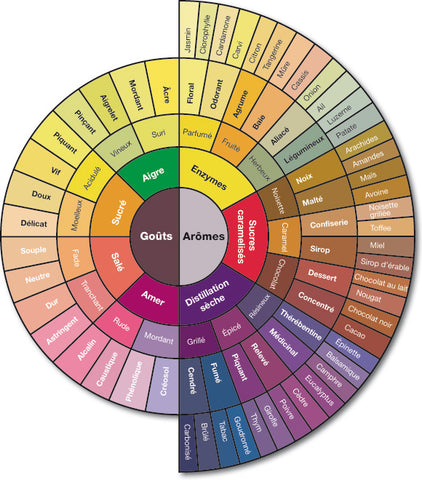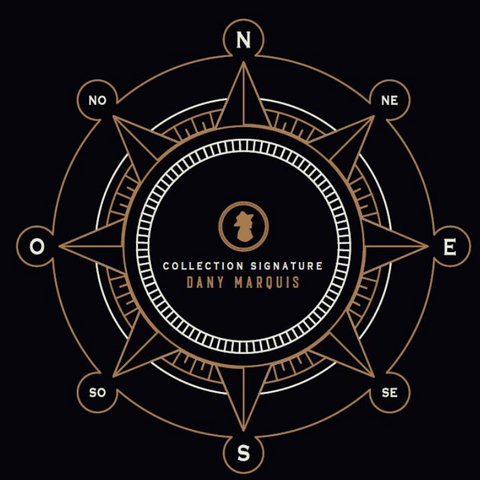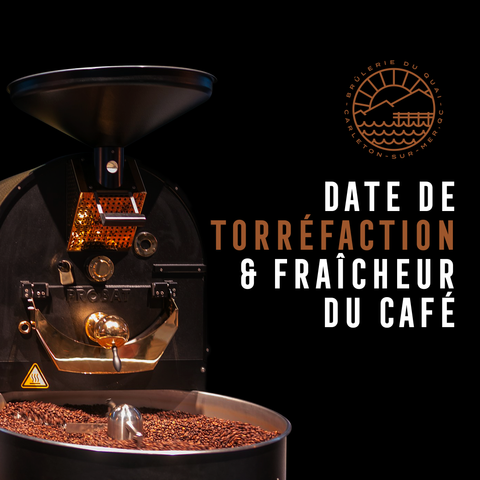Bitterness
In many food products, bitterness is a valued and desired characteristic. Beer, dark chocolate, red wines have profiles that display bitterness as a quality. However, bitterness must be well controlled in order to participate in the taste experience. And coffee is no exception, however, the bitterness of coffee is a characteristic that I don't particularly like. This is why I am always perplexed when a customer asks me for a bitter coffee, because for me, the bitterness of coffee, unlike beer for example, falls into the category of defects. At least, which we must try to tame, minimize and integrate into a desired taste profile.
First of all, we must know that bitterness is one of the 4 primary flavors, sensations identified by the tongue and the taste buds.
- Acid
- Sugar
- Dirty
- Bitter
We could add Umami but it's not really something you find in coffee. Unless you replace sugar with glutamate  monosodium, or to put coffeemate, or even to look at the ingredients of the cream of certain big coffee companies…
monosodium, or to put coffeemate, or even to look at the ingredients of the cream of certain big coffee companies…
If we look at the coffee flavor wheel, bitterness is broken down into two sections:
- Rude (Harsh)
-
- Alkaline
- Caustic
- Pungent
- Phenolic
- Creosol
Nothing very tempting about that. Coffee naturally contains a certain amount of bitterness, because of caffeine, certain non-volatile acids (chlorogenic and quinic), trigonelline, an alkaloid found in several other plants including tea leaves, beans cocoa, cola, hemp seeds. So much for the natural side of the bitterness of the green coffee bean which is greatly reduced during roasting. But we can also amplify the sensation of bitterness during the development of the roasting and at the level of the cup preparation.
We will therefore speak of harsh bitterness (Harsh) when the bitterness is added to a dominant acidity while the biting bitterness (Pungent) is rather due to a combination with a more pronounced salty side. Often, low quality coffees like robustas have these flavors but in general these coffees are not marketed. The coffees that generally end up in the warehouses of coffee producer federations have passed the rigorous tests of tasting experts. This approach makes it possible to have balanced coffees with a pleasant and acceptable natural bitterness and to identify the quality of the bean in order to set the export price.
So, the coffees received in the workshop of your favorite roaster are not bitter coffees. All that remains is the roasting which can, in certain cases, develop biting bitterness, especially phenolic, when the grain goes beyond the 2nd crack, as with our very famous Zombie Alarm Clock or its twin, the Organic Zombie . These are bitter enough to wake even the dead! (without losing their smoked cocoa flavor). At this time, the bean undergoes Pyrolysis worthy of a dry distillation used to extract essence from charcoal. So, heavy roasting automatically produces a very bitter coffee. Good for those looking for this type of experience, but in my case, it's not really my cup of tea. We recognize a coffee roasted at the 2nd crack by its oily appearance, its very dark color tending to black. With this type of grain, the majority of sugars developed during the Maillard reaction are destroyed during the pyrolization of the bean, destroying any sweet flavors, and replacing them with bitter, phenolic flavors, often associated with “medicinal” aromas or perfumes. or “band-aid”. So your favorite roaster is responsible! But if that's what you wanted, so much the better, he's responsible for your happiness.
But if you opt for a less roasted coffee, there is a good chance that you will develop bitterness during preparation.
What I mean by this is that unless you buy a very dark roast coffee, if your coffee is bitter, it's your fault! Yes, yes, to you, and not to the roaster! I mention this because I often speak with novice roasters who are blamed for all the incompetence of consumers in terms of preparation.
The bitterness in your cup of coffee can come from one or a combination of the following three points:
- Over-extract the coffee;
- Using water that is too hot or too cold;
- Not setting the correct grind level.

Over-extract the coffee
In short, passing too much water through the coffee mass. This principle applies especially to espresso, but also to other preparation methods.
Once the water has drawn from the roasted coffee bean all the soluble elements, oils, dust, there is a stage where the coffee has nothing more to offer. At this point, it is time to turn off the pump of your espresso machine. In general, we will speak for an espresso of a ratio of 30% for an elongated one (18g of coffee / 60g of liquid coffee) If you want it more elongated, please, do not continue to send water with the pump through the grinds which will have the effect of increasing the bitterness of the coffee. At this point, it is best to add hot water to your extraction, preferably before so as not to damage the crema. We will call this beverage an Americano because by continuing the extraction you will look for deeper components inside the coffee shards, which will accentuate the bitterness of your cup.
In the case of filter coffee, passing too much water through the grounds will have the same effect. In the case of a preparation by complete immersion like a piston or clever, it will rather be too long a contact which will accentuate the bitterness.
So, too much water or too long water/coffee contact.
Wrong water temperature
The ideal water temperature for brewing coffee is between 92°C and 96°C. This temperature is defined by the SCAA “Golden cup” standard. Too low a temperature under-extracts the coffee, while too high a temperature brings out the same bitter components as over-extracting. It is difficult with residential machines to have control over the temperature. Again, if your coffee isn't good, don't go beating your favorite roaster, try measuring your water temperature. If it's not between 92°C and 96°C, look no further.
For example, the kettle temperature of Keurig coffee makers is 89°C (192°F) for a brewing temperature between 82°C and 85°C.
Grind level
Here I can return to the concept of over/under extraction. Either will accentuate the bitterness of your cup.
What must be taken into consideration here is that the grind level must be adapted to the water/coffee contact time required by the chosen preparation method.
For an espresso, with a very short contact time (30-45s) we will use a very fine grind. For a piston, for 5 minutes of infusion, we will use a coarse grind.
If your grind is not suitable, you will over-extract with a grind that is too fine for your brewing method, while a grind that is too coarse will create under-extraction. This is why a mill at home is preferred in order to master this aspect.
5 tips for less bitter coffee
Now that you know a little more, here are 5 tips to help you get less bitter and more pleasant coffee:
- Buy less roasted coffees , with fewer, if any, oil stains on the bean. Light roast coffees have fewer soluble elements, higher acidity content, and much richer and more numerous aromas than over-roasted coffees. Less roasted coffees are less bitter;
- Use the correct dosage and contact time. SCAA standard 1/16 = 28g of coffee for 450g/ml of water. Contact your roaster for more information regarding your preparation method;
- Grind your coffee with a grinder just before preparation, to the correct grinding level;
- Use a filtered method (Chemex, Kalita, V60, etc.) the filter will absorb some of the soluble elements that can cause bitterness;
- Obtain quality preparation equipment, maintain it and learn how to use it.
And for those who want to continue reading me, know that the direct connection with coffee ends here and that I allow myself a little philosophical histrionics based on my writings above.
The bitterness…
Because if we find it in certain foods, we can also find it in ourselves. This strange feeling of injustice, anger, revolt and  of sadness, all mixed together deep in our hearts. You know what I'm talking about, we all go through it. It is enough to experience a particular situation that makes us suffer and for there to be someone responsible between our misfortunes and happiness. It's the fault of... So, we blame our situation on someone around us, telling ourselves that they could have helped us avoid it. So, this feeling of injustice, anger, revolt, sadness eats us from the inside. These feelings that remain trapped deep in our hearts end up fermenting to give our words and our actions a bitter, harsh and biting taste. In fact, we don't care much, because bitterness is mostly felt by the people around us. A true poison, we can keep bitterness deep within us for a very long time, because resentment is one of the conditions for the establishment of bitterness. And this persistent anger clings and transforms us, makes us arch our backs, tucks our chin between our shoulders, frowns our eyebrows, wrinkles our foreheads. It even convinces us that we are right. It is unfair. And we start playing devil's advocate every time someone talks to us about their dreams, we criticize without humility, without courtesy. And this bitterness will remain in us as long as it does not succeed, as long as it does not come out in concrete action, to go to the end, to exorcise it, to close the loop. Bitterness can kill you. It's long, painful and deadly.
of sadness, all mixed together deep in our hearts. You know what I'm talking about, we all go through it. It is enough to experience a particular situation that makes us suffer and for there to be someone responsible between our misfortunes and happiness. It's the fault of... So, we blame our situation on someone around us, telling ourselves that they could have helped us avoid it. So, this feeling of injustice, anger, revolt, sadness eats us from the inside. These feelings that remain trapped deep in our hearts end up fermenting to give our words and our actions a bitter, harsh and biting taste. In fact, we don't care much, because bitterness is mostly felt by the people around us. A true poison, we can keep bitterness deep within us for a very long time, because resentment is one of the conditions for the establishment of bitterness. And this persistent anger clings and transforms us, makes us arch our backs, tucks our chin between our shoulders, frowns our eyebrows, wrinkles our foreheads. It even convinces us that we are right. It is unfair. And we start playing devil's advocate every time someone talks to us about their dreams, we criticize without humility, without courtesy. And this bitterness will remain in us as long as it does not succeed, as long as it does not come out in concrete action, to go to the end, to exorcise it, to close the loop. Bitterness can kill you. It's long, painful and deadly.
So if you believe that you have a little bitterness in you, or worse that your heart is overflowing with this diffuse and sneaky feeling, I invite you to open the door to eliminate all traces of it within you.
5 tips for a less bitter heart
Now that we've opened the door, here are 5 tips to help you get rid of the bitterness inside you:
- Move your butt for at least 30 minutes a day. If your forehead isn't wet after 30 minutes, it doesn't count. Rain doesn't count either. Push the machine that is your body, push it to the limit. It feels good ;
- Take some quiet and rest time. Buy yourself a hammock, go where there are trees, water, nature, green, and set up your hammock between two trees and swing gently while looking at the clouds. 2 hours minimum;
- Smile, force yourself if necessary. Smile with your eyes, give the people you meet sincere smiles, those that form crow's feet. People may think you're crazy, but over time it changes;
- Surround yourself with positivity, positive, happy people, who smile with their eyes, listen to happy music, happy films;
- Drink good coffee. I had to put it on!
- Take care of yourself, do yourself good, you deserve it. And because you are a good person, you forgive yourself and move on from the shitty events in life.
And after putting these few tips into practice, you will forgive the source of your bitterness, because life is like food, a happy mixture of sweet, salty, sour and bitter. And the pleasures of the world, even the most perfect, always have a touch of bitterness.
It's like coffee!
Danny Marquis





Comments (8)